Serving 570 students in grades Prekindergarten-5, Heritage Elementary School ranks in the top 10% of all schools in Tennessee for overall test scores (math proficiency is top 10%, and reading proficiency is top 10%).
The percentage of students achieving proficiency in math is 63% (which is higher than the Tennessee state average of 31%). The percentage of students achieving proficiency in reading/language arts is 57% (which is higher than the Tennessee state average of 37%).
The student:teacher ratio of 13:1 is lower than the Tennessee state level of 15:1.
Minority enrollment is 31% of the student body (majority Hispanic and Asian), which is lower than the Tennessee state average of 43% (majority Black and Hispanic).
Quick Stats (2025)
- Grades: Prekindergarten-5
- Enrollment: 570 students
- Student:Teacher Ratio: 13:1
- Minority Enrollment: 31%
- Overall Testing Rank: Top 10% in TN
- Math Proficiency: 63% (Top 10%)
- Reading Proficiency: 57% (Top 10%)
- Science Proficiency: 56% (Top 20%)
- Source: National Center for Education Statistics (NCES), TN Dept. of Education
Top Rankings
Heritage Elementary School ranks among the top 20% of public schools in Tennessee for:
Category
Attribute
Overall Rank
Math Proficiency
Reading/Language Arts Proficiency
Science Proficiency
School Overview
Heritage Elementary School's student population of 570 students has stayed relatively flat over five school years.
The teacher population of 44 teachers has stayed relatively flat over five school years.
Grades Offered
Grades Prekindergarten-5
Total Students
570 students
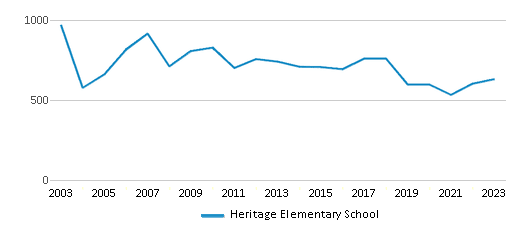
Gender %
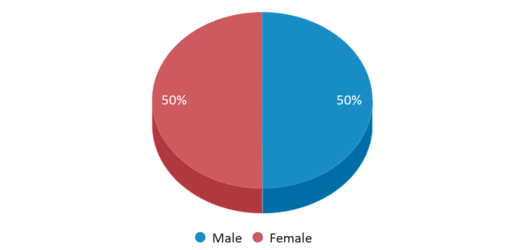
Total Classroom Teachers
44 teachers
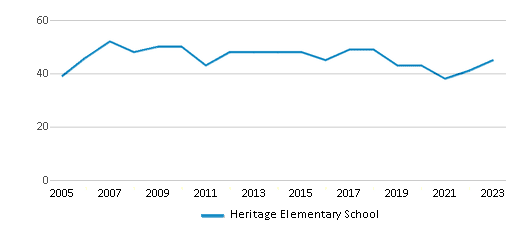
Students by Grade
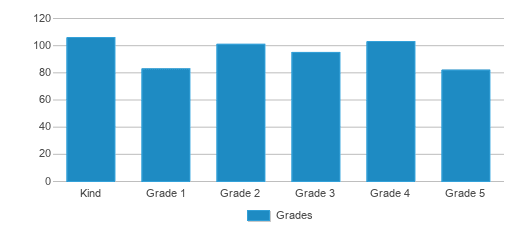
School Rankings
Heritage Elementary School ranks within the top 10% of all 1,761 schools in Tennessee (based off of combined math and reading proficiency testing data).
The diversity score of Heritage Elementary School is 0.50, which is less than the diversity score at state average of 0.61. The school's diversity has stayed relatively flat over five school years.
Overall Testing Rank
#118 out of 1761 schools
(Top 10%)
(Top 10%)
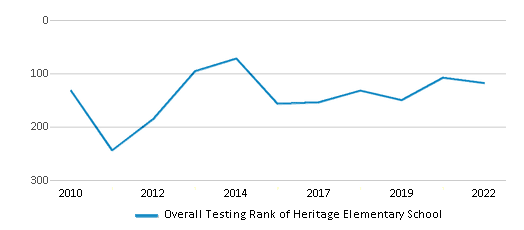
Math Test Scores (% Proficient)
63%
31%
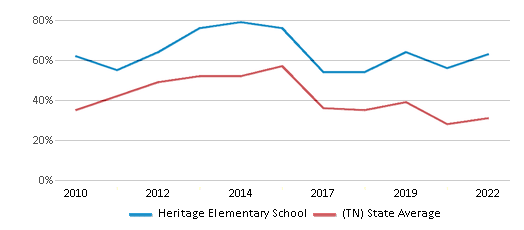
Reading/Language Arts Test Scores (% Proficient)
57%
37%
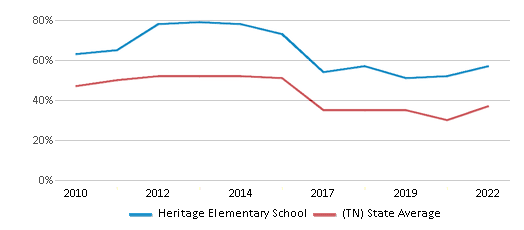
Science Test Scores (% Proficient)
56%
40%
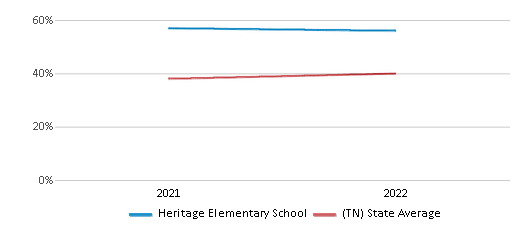
Student : Teacher Ratio
13:1
15:1
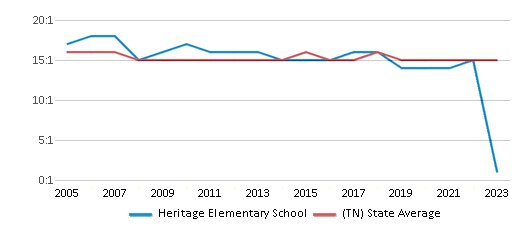
American Indian
n/a
n/a
Asian
10%
2%
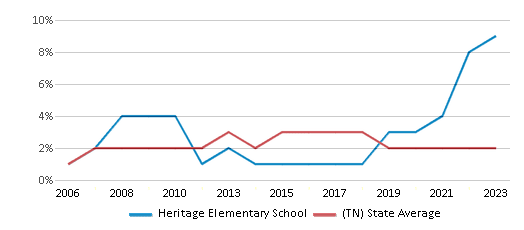
Hispanic
12%
15%
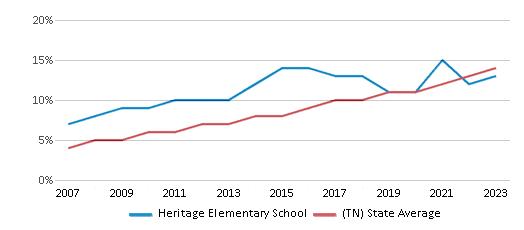
Black
4%
21%
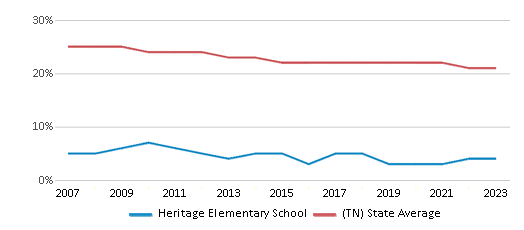
White
69%
57%
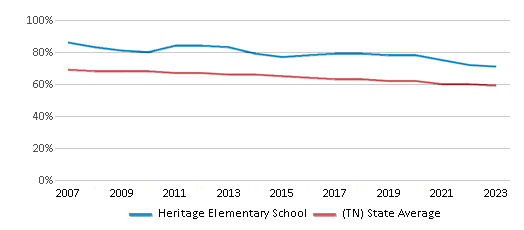
Hawaiian
n/a
n/a
Two or more races
5%
5%

All Ethnic Groups
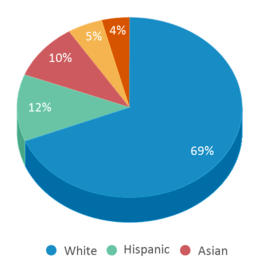
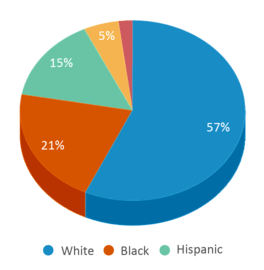

Participates in the National School Lunch Program (NSLP)
Yes
Eligible for Free Lunch
20%
45%
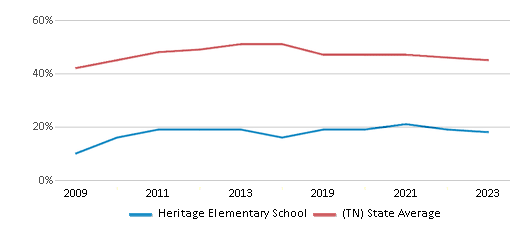
Eligible for Reduced Lunch
9%
6%
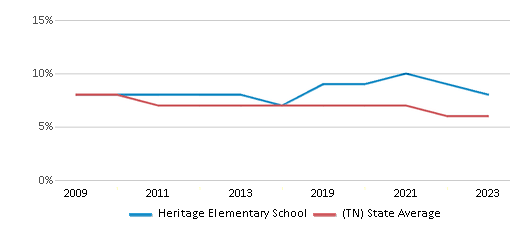
School Statewide Testing
School District Name
Source: National Center for Education Statistics (NCES), TN Dept. of Education
Profile last updated: 02/09/2025
Frequently Asked Questions
What is Heritage Elementary School's ranking?
Heritage Elementary School is ranked #118 out of 1,761 schools, which ranks it among the top 10% of public schools in Tennessee.
What schools are Heritage Elementary School often compared to?
Heritage Elementary Schoolis often viewed alongside schools like Bethesda Elementary School, Thompson's Station Elementary School by visitors of our site.
What percent of students have achieved state testing proficiency in math and reading?
63% of students have achieved math proficiency (compared to the 31% TN state average), while 57% of students have achieved reading proficiency (compared to the 37% TN state average).
How many students attend Heritage Elementary School?
570 students attend Heritage Elementary School.
What is the racial composition of the student body?
69% of Heritage Elementary School students are White, 12% of students are Hispanic, 10% of students are Asian, 5% of students are Two or more races, and 4% of students are Black.
What is the student:teacher ratio of Heritage Elementary School?
Heritage Elementary School has a student ration of 13:1, which is lower than the Tennessee state average of 15:1.
What grades does Heritage Elementary School offer ?
Heritage Elementary School offers enrollment in grades Prekindergarten-5
What school district is Heritage Elementary School part of?
Heritage Elementary School is part of Williamson County School District.
School Reviews
5 5/17/2016
Coming from private schools I was skeptical for a good bit. Although I still don't like the red tape and hoops you have to jump through to get some things done that would. E much more simple in a private school, I can't say enough about the teachers and administration at Heritage. My. Hold is SO well loved and although I''m not sure the education is as I wish it were, it's a viable and wonderful alternative for those of us who can't finance private education. The class size is too big with 21 students in my child's kindergarten class and no assistant but that's to be expected. They really work hard to love the children individually and nurture their individual strengths and Dr. Allen as principal, along with Dr. Johnson are fabulous. Highly recommend overall!
Review Heritage Elementary School. Reviews should be a few sentences in length. Please include any comments on:
- Quality of academic programs, teachers, and facilities
- Availability of music, art, sports and other extracurricular activities
Recent Articles

What Is A Charter School?
Explore the world of charter schools in this comprehensive guide. Learn about their history, how they operate, and the pros and cons of this educational innovation. Discover key facts about charter schools, including admission policies, demographics, and funding, as well as what to look for when considering a charter school for your child.

10 Reasons Why High School Sports Benefit Students
Discover the 10 compelling reasons why high school sports are beneficial for students. This comprehensive article explores how athletics enhance academic performance, foster personal growth, and develop crucial life skills. From improved fitness and time management to leadership development and community representation, learn why participating in high school sports can be a game-changer for students' overall success and well-being.

February 05, 2025
Understanding the U.S. Department of Education: Structure, Impact, and EvolutionWe explore how the Department of Education shapes American education, from its cabinet-level leadership to its impact on millions of students, written for general audiences seeking clarity on this vital institution.





